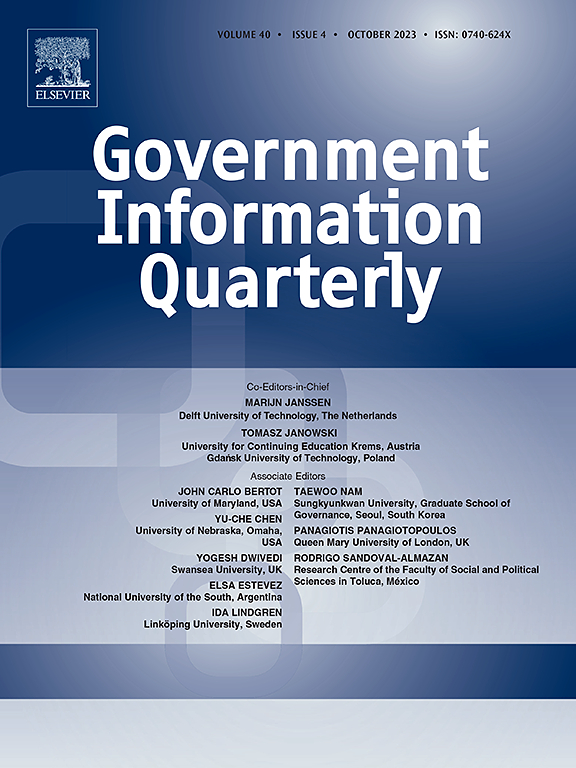Public perceptions of responsible AI in local government: A multi-country study using the theory of planned behaviour
IF 10
1区 管理学
Q1 INFORMATION SCIENCE & LIBRARY SCIENCE
引用次数: 0
Abstract
The rise of Artificial Intelligence (AI) has significant implications for local government service delivery, offering considerable advantages alongside inherent risks that warrant careful management. While responsible AI has become a focal point in academic and policy discussions, public perceptions remain marginal in these debates. This paper explores how behavioural factors along with perceived risk, local government AI policy awareness and policy expectations influence public intentions to support local government responsible AI practices. Using the Theory of Planned Behaviour, this study examines a multi-factor survey through Confirmatory Factor Analysis, followed by Structural Equation Modelling to assess relationships between key factors. A survey questionnaire, conducted with participants from Australia, the United States, and Spain via the Prolific platform, reveals key insights: (a) perceived risk exhibit a stronger influence than other factors; (b) policy awareness plays a critical role in shaping public intention towards support for responsible practices; (c) greater AI policy awareness correlates with more realistic expectations of local government AI policies; (d) social influence lacks a notable impact in this context. These findings provide valuable guidance for urban policymakers in crafting AI strategies that promote responsible AI implementation within local government services.
公众对地方政府负责任人工智能的看法:一项使用计划行为理论的多国研究
人工智能(AI)的兴起对地方政府的服务提供产生了重大影响,在提供可观优势的同时,也存在需要谨慎管理的固有风险。虽然负责任的人工智能已成为学术和政策讨论的焦点,但公众的看法在这些辩论中仍然处于边缘地位。本文探讨了行为因素以及感知风险、地方政府人工智能政策意识和政策预期如何影响公众支持地方政府负责任的人工智能实践的意愿。本研究运用计划行为理论,透过验证性因子分析(Confirmatory Factor Analysis)检视多因素调查,然后运用结构方程模型(Structural Equation modeling)评估关键因素之间的关系。通过多产平台对来自澳大利亚、美国和西班牙的参与者进行的问卷调查揭示了关键的见解:(A)感知风险比其他因素的影响更大;(b)政策意识在形成公众支持负责任做法的意愿方面发挥关键作用;(c)更强的人工智能政策意识与地方政府对人工智能政策更现实的期望相关;(d)社会影响在这方面缺乏显著影响。这些发现为城市决策者制定人工智能战略提供了有价值的指导,以促进当地政府服务部门负责任地实施人工智能。
本文章由计算机程序翻译,如有差异,请以英文原文为准。
求助全文
约1分钟内获得全文
求助全文
来源期刊

Government Information Quarterly
INFORMATION SCIENCE & LIBRARY SCIENCE-
CiteScore
15.70
自引率
16.70%
发文量
106
期刊介绍:
Government Information Quarterly (GIQ) delves into the convergence of policy, information technology, government, and the public. It explores the impact of policies on government information flows, the role of technology in innovative government services, and the dynamic between citizens and governing bodies in the digital age. GIQ serves as a premier journal, disseminating high-quality research and insights that bridge the realms of policy, information technology, government, and public engagement.
 求助内容:
求助内容: 应助结果提醒方式:
应助结果提醒方式:


